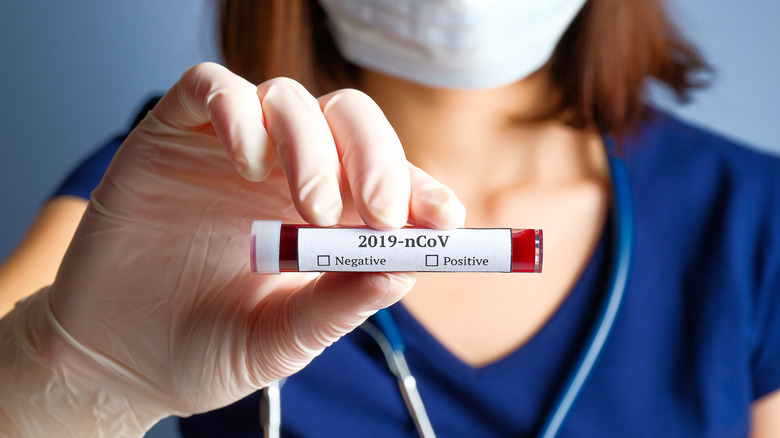Your Latest COVID-19 Updates And Questions Answered
Global health experts are doing their best to slow the spread of Coronavirus, which is now known as COVID-19. But they can only do so much, and it's continuing to make its way around the world. Despite hearing about it everywhere, you might still have a lot of questions about it. We're here to answer them.
How Far Has It Spread?
How Far Has It Spread?
COVID-19 has now spread to at least 40 countries, with China, South Korea, Italy and Iran getting hit the hardest. There have been more than 80,000 reported cases, and at least 2,800 deaths. Most fatalities have been in China.
The U.S. now has its first case of "community spread" COVID-19. That means that the cases before came from people who had traveled to affected areas or came in extremely close contact with someone who had. But a California patient hadn't traveled recently, and therefore could have picked it up during their daily life in their local community, which is where the term "community spread" comes from.
How Worried Should We Be?
How Worried Should We Be?
Global health officials are hopeful that it won't turn into a pandemic. But the instance of a community spread case in the U.S. as well as rising numbers in other parts of the globe underscore the need to take measures to stop the spread of the disease.
As always, wash your hands with warm water and soap, and try to avoid touching your face to keep harmful germs from getting into your mouth. If you think you have any symptoms, call a doctor immediately, and take their advice on how to get to their office to avoid spreading anything. Encourage your family and friends to do the same if they describe symptoms like a fever, a heavy cough or shortness of breath.
These are good precautions to take at any time, as they can help to stop more common but deadly diseases like the common cold and flu.
Will School Get Cancelled?
Will School Get Cancelled?
It depends where you live! Many schools in China, Japan, Iran and South Korea are closing to help prevent the spread. Massive closings haven't happened yet in the U.S., though the Centers for Disease Control did alert people that should be prepared for such an outcome if COVID-19 doesn't slow down.
They recommended that schools look into learning options that wouldn't involve students leaving their homes and risking exposure to the disease, such as "teleschooling" via the internet.
Even if that's not something your school would do, it's important to remember that closings are put in place as an extraordinary measure to stop the spread of disease. That means that days off shouldn't be filled with unnecessary travel or trips to crowded places like shopping malls or live sporting events (some of which are also being cancelled), where you could unknowingly spread or pick up the disease. Instead, you might have to stick to texting and social media to keep up with your friends while you wait out the outbreak.
Is It True Diet Cokes Might Vanish From Shelves?
Is It True Diet Cokes Might Vanish From Shelves?
They probably won't vanish. But it's hard for everyone to understand the massive role China plays in producing many of the products we use every single day. They make everything from iPhones to copper to cars to the artificial sweetener found in Coke Zero and Diet Cokes. With production slowed or closed in many parts of China to prevent the COVID-19 spread, you may see that some of your favorite products aren't as readily available or don't ship to your house as quickly.
It might be frustrating, but try to be patient if you can't get something as quickly as you'd like it. Remember that people's lives and livelihoods are on the line here, and take it as an opportunity to shop around for products you can find locally.
What’s a Pandemic? Is This One?
What's a Pandemic? Is This One?
A pandemic is derived from a Greek word that means "everybody," so a pandemic typically means there is a risk that everybody in the world could be exposed to a disease. The last one happened in 2009, with the H1N1 virus. Outbreaks that stick to certain areas are called epidemics, and past ones have included the 2014 Ebola outbreak and the Bubonic Plague.
So far, the World Health Organization doesn't think that the COVID-19 outbreak is a pandemic, but they did say it has the potential to turn into one – all the more reason to keep washing your hands and following the recommendations of the CDC to do your part to stop the spread.
Cite This Article
MLA
Dragani, Rachelle. "Your Latest COVID-19 Updates And Questions Answered" sciencing.com, https://www.sciencing.com/coronavirus-news-update-13725115/. 3 March 2020.
APA
Dragani, Rachelle. (2020, March 3). Your Latest COVID-19 Updates And Questions Answered. sciencing.com. Retrieved from https://www.sciencing.com/coronavirus-news-update-13725115/
Chicago
Dragani, Rachelle. Your Latest COVID-19 Updates And Questions Answered last modified March 24, 2022. https://www.sciencing.com/coronavirus-news-update-13725115/
